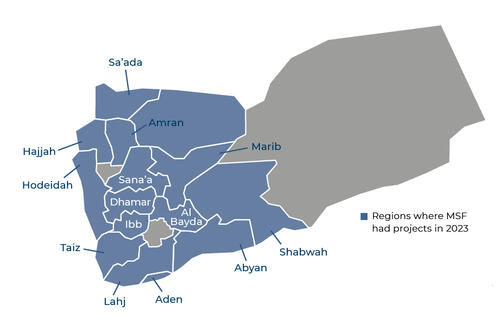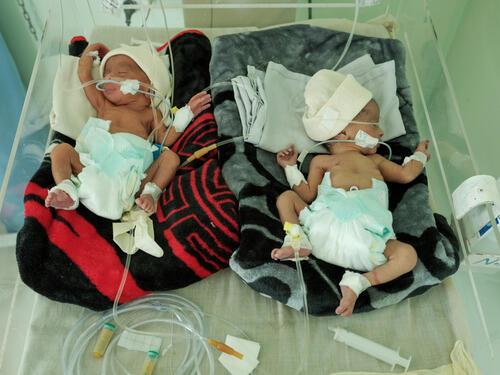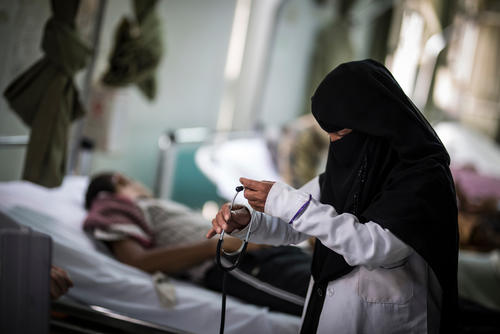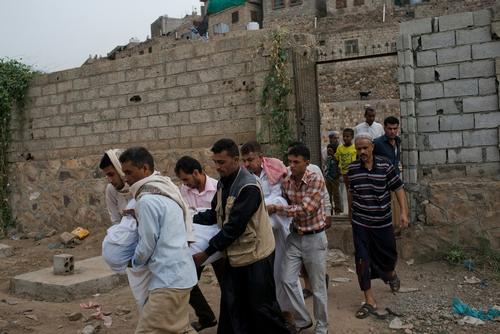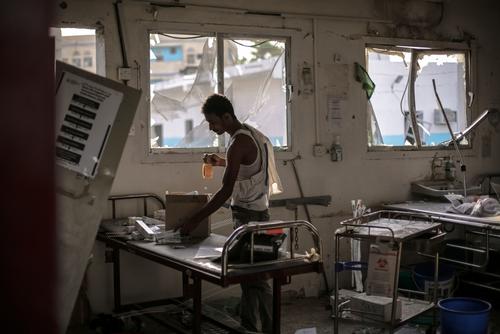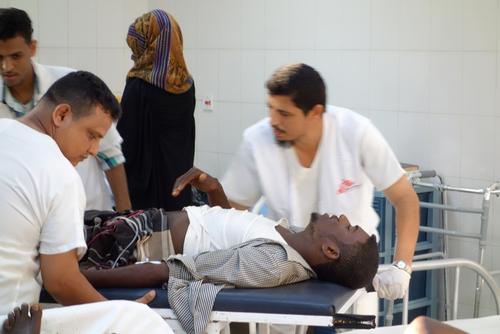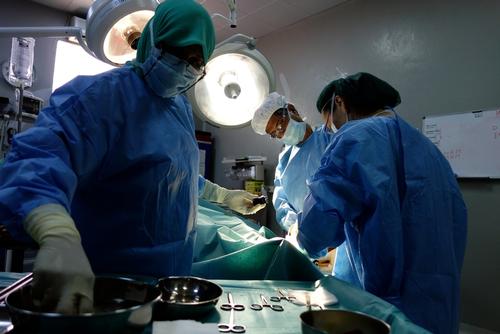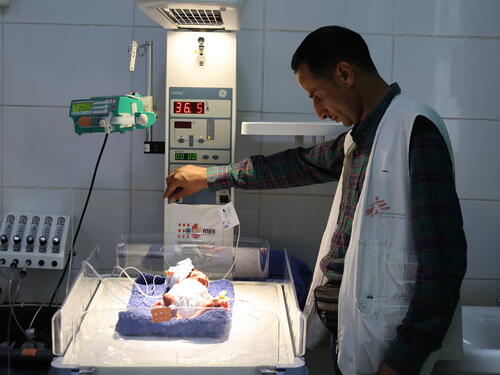The ongoing humanitarian crisis in Yemen is driven not only by armed conflict, but the consequent deterioration in the economy, which has had a severe impact on people’s health, living conditions and access to basic services. Affordable healthcare at the community level is extremely limited, and in some locations is non-existent.
Although the large-scale conflict generally abated in 2023, since October, and following an escalation in the Red Sea, multiple regions across the north of Yemen were bombed on a daily basis, exacerbating an already appalling humanitarian situation. Millions of Yemenis remain displaced and in desperate need of assistance.
In 2023, MSF supported 17 hospitals and 18 other health facilities across 13 governorates, focusing on maternal and child health, specialist and emergency care, and responding to malnutrition and outbreaks of preventable diseases such as cholera, diphtheria and measles. Due to the lack of basic healthcare in rural areas, the specialist facilities we support are often overwhelmed, as people tend to arrive with complications because they were unable to receive care when they needed it. To address this issue, we assisted health centres across the country by providing financial incentives to staff, training, donations of medicines, and funding for referrals to MSF-supported facilities.
Malnutrition
The malnutrition crisis in Yemen has many underlying causes. After nearly a decade of conflict, and a drastic deterioration in the economy, many people have lost their livelihoods. High inflation rates have reduced their purchasing power so they can no longer afford to buy enough nutritious food. Diminishing food aid, including the suspension of the World Food Programme’s distributions in northern Yemen in 2023, have also contributed to increasing food insecurity for millions of Yemenis.
In 2023, our teams responded to a surge in malnutrition among children in several governorates. In Taiz, we started supporting the outpatient therapeutic feeding centre (TFC) in Mafraq Al-Mocha, in Mawza district, in March. In Amran, we supported Huth hospital to increase capacity to respond to malnutrition during the peak season, between June and December. In Hodeidah, we set up three outpatient TFCs in Ad-Dahi, Bayt Atta and Al-Kadan. In Hajjah, we extended the capacity of the inpatient TFC at Abs general hospital from 45 to 88 beds during the peak season. In Sa’ada, we doubled the number of beds and increased staffing and supplies.
Vaccine-preventable diseases
There has been a marked increase in preventable diseases such as cholera, diphtheria and measles over recent years, due to low vaccination coverage, poor living conditions and the collapse of the healthcare system. In 2023, our teams responded to a rise in measles cases across several governorates. In Al-Bayda, we offered treatment and conducted training sessions for healthcare providers on treating the disease in eight locations. In Taiz, we opened a 16-bed measles isolation unit inside our mother and child hospital in Taiz Houban to respond to an unprecedented surge in cases. We also treated measles patients in MSF-supported facilities across seven other governorates.
Since 2021, diphtheria cases have been rising significantly, with a sharp uptick in 2023. In response, MSF began supporting Al-Wahdah hospital in Dhamar governorate in October, with management of the patient isolation unit, treatment, intensive care and laboratory testing, donations of medical supplies, food and hygiene materials, and staff training.
In addition, our teams responded to a cholera outbreak in Aden and Shabwa governorates by running two treatment units from October 2023 until the end of January 2024, and conducting health promotion, water and sanitation activities to prevent the spread of the disease. During the same period, we ran two acute watery diarrhoea treatment centres in Ad-Dahi and Al-Zaydiyah districts, in Hodeidah governorate.
Maternal and child healthcare
In 2023, we scaled up our maternal and child healthcare activities in most governorates in Yemen, in response to the ever-increasing demand. In Taiz, our teams assisted women during deliveries and obstetric surgery, and provided inpatient neonatal and paediatric care in both Taiz Houban and Taiz city. In May, we started collaborating with the Ministry of Health to support Mocha general hospital’s inpatient paediatric department.
In our hospital in Mocha, we assist women who have complicated deliveries. In Hodeidah, we ran specialist maternal and neonatal services at Al-Qanawes mother and child hospital. We also opened a paediatric ward there in May, offering inpatient care for children under 15 years old. In Hajjah governorate, our team continued to support several departments at Abs general hospital, including the maternity, neonatal and paediatric wards.
Since September 2022, we have been partnering with Ataq’s mother and child hospital in Shabwa to provide paediatric healthcare.
During the year, the hospitals we support in Khamer, Amran governorate, and Haydan, Sa’ada governorate also received a higher number of referrals for obstetric emergencies from local health units compared with the previous year.
In Marib, we continue to provide general healthcare services for displaced people, host communities, migrants and other people living in vulnerable circumstances. We provide services for reproductive healthcare, malnutrition, chronic diseases and mental health care.
Trauma and surgical care
Due to a decrease in fighting and a subsequent reduction in trauma cases, we closed a number of our trauma projects, including our trauma hospital in Mocha, which had been providing lifesaving surgical care since 2018. We also handed over part of our surgical activities at Abs general hospital to the Ministry of Health, while we continued to perform obstetric surgeries.
Similarly, we closed our trauma centre in Taiz Houban and started referring patients to Al-Wehda governmental hospital. The MSF trauma centre in Aden also received a much lower number of war-wounded patients compared to previous years. Over the years, our staff in the centre had treated patients arriving from various frontlines through a referral system from Lahj, Abyan and Shabwa, where we supported health facilities until the end of 2023. The MSF trauma centre continues to offer orthopaedic services such as internal fixation for bone fractures and reconstructive surgery.
Mental health
Mental health support is a core part of our activities in Hajjah and Hodeidah governorates. In Abs hospital and our mental health clinic in Hajjah city, we provide psychiatric care, counselling and psychotherapy. In Hajjah city, we run a day centre offering psychological care, and a rehabilitation programme for patients with chronic mental health conditions.
